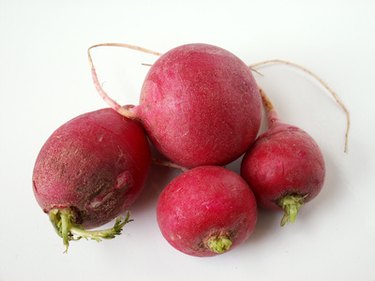
Most vegetable plants require full sunlight to flourish and produce healthy crops, but if your garden does not receive full sunlight, you can still plant a vegetable garden if you carefully select the vegetables that you plant and pay close attention to soil requirements and watering instructions. According to Colorado State University, leafy vegetables and root vegetables are more tolerant of shade than plants such as eggplant, peppers, tomatoes and squash.
Leaf Lettuce
Video of the Day

Leaf lettuce is an annual vegetable that does best in full sunlight but, according to Texas AgriLife Extension Service, will also flourish in partial shade. Space leaf lettuce plants six inches apart, and add compost or manure to the soil to increase the likelihood that the lettuce will grow vigorously. Plant leaf lettuce in soil with pH levels between 6.2 and 6.8, and fertilize regularly with a nitrogen-based fertilizer. Water the plant regularly. Leaf lettuce should mature in 45 to 55 days.
Video of the Day
Radishes

Radishes are fast-growing, colorful vegetables that, according to Texas AgriLife Extension Services, can grow well in partial shade, but have a milder flavor than when grown in full sunlight. Use these spicy, ruby-colored gems in salads, crudites or as a garnish. Plant in well-drained soil with pH levels between 6.0 and 7.0 as soon as the ground is soft enough to dig—radishes prefer being planted in cool soil during spring or fall. Radishes grow to maturity in approximately 25 to 35 days.
Root Vegetables

Root vegetables such as turnips, carrots, parsnips, potatoes and beets require a minimum of one-half day of full sunlight. If your garden receives full sunlight during the morning and shade during the afternoon (or vice versa) you may be able to successfully grow root vegetables. Select a site with well-drained soil; till the area thoroughly. According to Regents of the University of Minnesota, root vegetables grow best in "deep, loose soil." Root vegetables will not grow well in acidic soil. Test your soil and add lime or fertilizer as necessary.
Cruciferous Vegetables

According to Colorado State University, cruciferous vegetables, such as broccoli, kale, cauliflower and cabbage, grow well in partial shade. These vegetables flourish in well-drained soil with pH levels between 6 and 6.5. When planting these vegetables, add compost or manure to your soil mixture along with garden fertilizer to ensure that the vegetables will receive all necessary nutrients.
- USA Gardener: Growing Leaf Lettuce
- USA Gardener: How to Grow Radish
- Colorado State University Cooperative Extension: Vegetables for the Shady Garden
- The University of Minnesota Extension: Growing Carrots and Other Root Vegetables in the Garden
- The University of Minnesota Extension: Growing Cole Crops